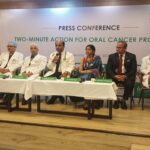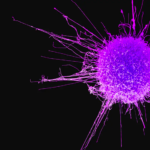India
healthysoch
New Delhi, September 18, 2020 :
Prostate cancer is a common malignancy seen worldwide which is highly treatable in the early stages. The incidence has risen in recent decades, mainly fuelled by more widespread use of prostate-specific antigen (PSA) testing, although prostate cancer mortality rates have remained relatively static over that time period. A man’s risk of prostate cancer is affected by his age and family history of the disease.
In observance of Prostate Cancer Awareness month i.e. September, Indian Council of Medical Research (ICMR) had released data in 2019 on the incidence rate of prostate cancer in India. It states that the incidence rate of prostate cancer is 9-10/100000 population, higher compared to other parts of Asia and Africa, but lower compared to the US and Europe. Hence, experts suggest going for complete physical examination including DRE in order to detect prostate cancer at an early stage.
Prostate cancer affects the prostate gland which is situated distal to the bladder neck. It is commonly seen in men above the age of 60. Surgical treatment includes open surgery that is the surgical removal of the prostate gland or minimal invasive surgery (MIS) robot-assisted radical prostatectomy. The additional benefits of the latter are precision surgery, less blood loss and reduced pain with a short hospital stay and early return to work.
The symptoms and signs of prostate cancer may include:
- Frequent urination
- Weak or interrupted urine flow or the need to strain to empty the bladder
- The urge to urinate frequently at night
- Blood in the urine
- Blood in the seminal fluid
- New onset of erectile dysfunction
- Pain or burning during urination, which is much less common
- Discomfort or pain when sitting, caused by an enlarged prostate
Prostate cancer case study:
Mr. Salim (name changed), a 71 years old man, a career diplomat from Bangladesh presented himself at HCG EKO Cancer Centre Kolkata suffering from prostate cancer.
He was diagnosed with Stage T3a N0 M0 Prostate Cancer with an initial PSA of over 20 ng /ml and Gleason Score of 4+4 in London. His bone scan was negative for metastases while MRI of pelvis showed a PIRADS 4 disease. Dr. Ayan Basu and the Radiation Oncology team at the hospital planned for long term Androgen Deprivation Therapy (ADT) for at least two years with a plan to start radical radiotherapy once PSA suppression less than 1ng/ml was achieved. He started neo-adjuvant hormonal therapy with the above advice and subsequently arrived in India in February 2020 for his radiotherapy.
He registered at the hospital to receive his radiation treatment. Mr. Salim (name changed) was treated with radical radiotherapy with escalating doses initially delivering 50 Gy to prostate, bilateral seminal vesicles and pelvic nodal stations with appropriate volumetric expansions to ensure dosimetric coverage followed by dose escalation to prostate till 76 Gy with Image Guided Radiotherapy. He completed his treatment uneventfully and returned to Bangladesh and continues to remain on hormonal therapy. He is on regular follow up and is asymptomatic with normal PSA levels.
Due to the advanced healthcare infrastructure, Kolkata is now able to witness the patients from the surrounding cities and countries flocking towards it for medical assistance with something as small as a pathological test to something as complicated as a robotic surgery or bone marrow transplantation. The specialists here are delivering care of international standards at a fraction of the international costs.
HCG EKO is one such single-specialty comprehensive cancer care centre in Kolkata established with a goal to deliver quality healthcare to patients coming from Eastern India and other South Asian countries like Bangladesh. This is an encouraging move as this helps not only the patients from surrounding countries but also the patients from surrounding cities and states access high-quality healthcare.
Androgen Deprivation Therapy (ADT)
Hormone therapy for prostate cancer is also known as androgen deprivation therapy (ADT). Prostate cancer cannot grow or survive without androgens, which include testosterone and other male hormones. Hormone therapy decreases the amount of androgens in a man’s body. Reducing androgens can slow the growth of the cancer and even shrink the tumor.
Hormone therapy may be used:
- Along with (or after) radiation treatment when there is a higher risk of the cancer returning.
- When prostate cancer is found outside the prostate in other parts of the body (metastatic) at the time of diagnosis.
- In advanced (metastatic) prostate cancer to shrink the cancer and slow the growth of tumors, which also might relieve signs and symptoms
- In locally advanced prostate cancer, to make external beam radiation therapy more effective in reducing the risk of recurrence.
- In those with a high risk of recurrence after initial treatment to reduce that risk.
The disease is highly prevalent with a relatively lower mortality rate, necessitating the search for ways to identify clinically significant prostate cancer requiring intensive treatment to improve survival.
Author : Dr Ayan Basu, Radiation Oncologist, HCG EKO Cancer Centre, Kolkata







